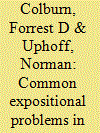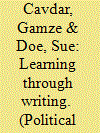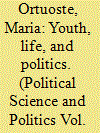|
|
|
Sort Order |
|
|
|
Items / Page
|
|
|
|
|
|
|
| Srl | Item |
| 1 |
ID:
111954


|
|
|
|
|
| Publication |
2012.
|
| Summary/Abstract |
In 2008 journalist Bill Bishop achieved the kind of notice that authors dream about. His book, The Big Sort: Why the Clustering of Like-Minded America Is Tearing Us Apart, was mentioned regularly during the presidential campaign; most notably, former president Bill Clinton urged audiences to read the book. Bishop's thesis is that Americans increasingly are choosing to live in neighborhoods populated with people just like themselves. In turn, these residential choices have produced a significant increase in geographic political polarization. Bishop does not contend that people consciously decide to live with fellow Democrats or Republicans; rather political segregation is a byproduct of the correlations between political views and the various demographic and life-style indicators people consider when making residential decisions. Whatever the cause, Bishop contends that the resulting geographic polarization is a troubling and dangerous development.
|
|
|
|
|
|
|
|
|
|
|
|
|
|
|
|
| 2 |
ID:
111967


|
|
|
|
|
| Publication |
2012.
|
| Summary/Abstract |
Words should be chosen and used carefully so that they convey the meaning or meanings that you intend-and do not convey any unintended or double meanings. Writing should leave little ambiguity or uncertainty about what you are referring to-unless some purposeful ambiguity is desired. Sometimes words that are abstract or superficial may be chosen to suit the writer's purpose. For example, there is a long tradition of euphemistic writing. But such use of words should be well-considered and deliberate, not the result of carelessness or indifference.
|
|
|
|
|
|
|
|
|
|
|
|
|
|
|
|
| 3 |
ID:
111958


|
|
|
|
|
| Publication |
2012.
|
| Summary/Abstract |
Within the subfields of political psychology and the study of gender, the introduction of new data collection efforts, methodologies, and theoretical approaches are transforming our understandings of these two fields and the places at which they intersect. In this article we present an overview of the research that was presented at a National Science Foundation (NSF) (#SES-1014854) funded conference "New Research on Gender in Political Psychology" at Rutgers University in March 2011. This scholarship represents the expanding questions and approaches that enhance our understanding of gender within political psychology. As a result, we suggest that further innovation is needed with regard to theory and methods to understand better how gender shapes the political attitudes and actions of individuals. Our discussion here covers the use of data, interdisciplinary methods, and intersectionality to study gender. We conclude with thoughts about the theoretical implications of this recent scholarship and the future of political science research on gender.
|
|
|
|
|
|
|
|
|
|
|
|
|
|
|
|
| 4 |
ID:
111956


|
|
|
|
|
| Publication |
2012.
|
| Summary/Abstract |
Who will win the next French presidential election? Forecasting electoral results from political-economy models is a recent tradition in France. In this article, we pursue this effort by estimating a vote function based on both local and national data for the elections held between 1981 and 2007. This approach allows us to circumvent the small N problem and to produce more robust and reliable results. Based on a model including economic (unemployment) and political (approval and previous results) variables, we predict the defeat, although by a relatively small margin, of the right-wing incumbent Nicolas Sarkozy in the second round of the French presidential election to be held in May 2012.
|
|
|
|
|
|
|
|
|
|
|
|
|
|
|
|
| 5 |
ID:
111959


|
|
|
|
|
| Publication |
2012.
|
| Summary/Abstract |
The New Research on Gender in Political Psychology Conference brought together new and experienced teachers with interests in gender politics. The conference session "Teaching Gender throughout the Curriculum" generated a great deal of discussion concerning the pedagogical practice of gender mainstreaming. Gender mainstreaming-the integration of gendered content into courses required for a major-was recognized as one of 11 recommendations for reforming the undergraduate political science curriculum in the 1991 APSA report "Liberal Learning an The Political Science Major: A Report to the Profession" (popularly referred to as the Wahlke Report). Little information is available on the prevalence of gender courses in the undergraduate curriculum, but the data that does exist suggest such courses are uncommon (Brandes et al. 2001). We found virtually no data on the practice of gender mainstreaming in political science and little data in the way of assessing the impact of gendered content when students are exposed to it. This absence of data suggests gender mainstreaming has not emerged as a serious priority for curricular reform.
|
|
|
|
|
|
|
|
|
|
|
|
|
|
|
|
| 6 |
ID:
111962


|
|
|
|
|
| Publication |
2012.
|
| Summary/Abstract |
Most rigorous studies conclude that there is no consistent partisan or ideological bias in the mainstream American news media. This suggests a natural but little-asked question: Why isn't there more bias in the media? A year spent working as a journalist suggests a possible answer: Advancing a political perspective does not help secure a place on the front page. Instead, the core incentive for a journalist is to be interesting. Interesting work that reveals the essence of a situation garners a more prominent spot in the newspaper and all its associated benefits. Because "interesting" sources are found on both the left and the right, among Republicans and Democrats, balance does not require a Solomonic commitment to fairness. Rather, balance can be achieved merely as a by-product of the effort to be interesting.
|
|
|
|
|
|
|
|
|
|
|
|
|
|
|
|
| 7 |
ID:
111965


|
|
|
|
|
| Publication |
2012.
|
| Summary/Abstract |
Prediction markets are designed to aggregate the information of many individuals to forecast future events. These markets provide participants with an incentive to seek information and a forum for interaction, making markets a promising tool to motivate student learning. We carried out a quasi-experiment in an introductory political science class to study the effect of prediction markets on student engagement with the course topics. Although we found no significant improvement in students' enthusiasm or extent of topical reading, we did find that those students who were already reading broadly at the course start were more likely to trade actively in the markets. These findings indicate that prediction markets may be most successful as an education tool in settings, like graduate education, where individuals are already knowledgeable about the topics of the market, instead of an introductory learning context.
|
|
|
|
|
|
|
|
|
|
|
|
|
|
|
|
| 8 |
ID:
111968


|
|
|
|
|
| Publication |
2012.
|
| Summary/Abstract |
Traditional writing assignments often fall short in addressing problems in college students' writing as too often these assignments fail to help students develop critical thinking skills and comprehension of course content. This article reports the use of a two-part (staged) writing assignment with postscript as a strategy for improving critical thinking in a lower-division political science course. We argue that through well-designed writing assignments, instructors can encourage students to reconsider concepts, critically evaluate assumptions, and undertake substantive revisions of their writing.
|
|
|
|
|
|
|
|
|
|
|
|
|
|
|
|
| 9 |
ID:
111963


|
|
|
|
|
| Publication |
2012.
|
| Summary/Abstract |
Many observers have argued that social media such as Facebook and Twitter will help opposition activists coordinate and overcome authoritarian regimes; others believe that such tools will have little impact. Evidence from the "Arab Spring" is inconclusive, with advocates for each position finding support in the events in Tunisia, Egypt, and elsewhere. When does social media help political movements succeed? Motivated by an experience serving as a "campaign manager" for a colleague's bid to become the Washington Post's "Next Great Pundit," I argue that relying on Internet-based social networking tools (such as Facebook and Twitter) may lead campaigns to perform more poorly when the regime is able to change the election's rules in mid-campaign. Consequently, researchers observing only the messages broadcast by social media will miss the true coordination taking place, which happens through channels unobservable to the regime. Examples from Middle Eastern politics suggest that real-world political activists recognize these distinctions and adjust their messaging accordingly.
|
|
|
|
|
|
|
|
|
|
|
|
|
|
|
|
| 10 |
ID:
111957


|
|
|
|
|
| Publication |
2012.
|
| Summary/Abstract |
This symposium consists of three papers written after a small mentoring conference, New Research on Gender in Political Psychology, which was held in New Brunswick, New Jersey, March 4-5, 2011. As junior scholars, we received a grant from the National Science Foundation (#SES-1014854) to organize a conference for the purposes of mentoring pretenure faculty and promoting scholarship on gender in political psychology. Each of the three articles in this symposium focuses on a different aspect of the conference.
|
|
|
|
|
|
|
|
|
|
|
|
|
|
|
|
| 11 |
ID:
111955


|
|
|
|
|
| Publication |
2012.
|
| Summary/Abstract |
I investigate one mechanism through which financial institutions could have used political influence to receive preferential treatment in the US Department of the Treasury-administered "bailout." I find that neither proxies of political influence nor other political variables, such as public interest in specific deals, can explain variance in the sale price of warrants (a type of financial asset) Treasury acquired through TARP's Capital Purchase Program. Moreover, I find that the more politically active the firm is, the more likely Treasury is to auction its warrants (thereby receiving fair market value). This conclusion is not consistent with recent studies investigating the role of such variables in the initial administration of TARP and can be interpreted as good news for American taxpayers.
|
|
|
|
|
|
|
|
|
|
|
|
|
|
|
|
| 12 |
ID:
111960


|
|
|
|
|
| Publication |
2012.
|
| Summary/Abstract |
In the summer of 2010, 52 Republican members of the US House of Representatives joined the newly formed Tea Party Caucus, bringing the first institutional voice to the Tea Party movement. To understand both the policy orientations of the organized Tea Party (in its caucus manifestation) and the institutional strength of the caucus's membership, we assess the extent to which caucus members are distinctive from their fellow Republicans in the US House of Representatives. Our results suggest that membership in the caucus is primarily driven by ideology and economics. Specifically, we find that Tea Party Caucus members are Republicans who are ideologically oriented toward limited government and lower taxes and who hail from particularly prosperous congressional districts. We find no evidence that Tea Party Caucus members serve safer districts or have greater seniority or institutional stature than their Republican colleagues who are not members of the caucus. These findings, we believe, speak not only to the nature and orientations of the Tea Party Caucus, but to the wider Tea Party movement itself.
|
|
|
|
|
|
|
|
|
|
|
|
|
|
|
|
| 13 |
ID:
111964


|
|
|
|
|
| Publication |
2012.
|
| Summary/Abstract |
During his confirmation hearings, then-judge John Roberts analogized the role of a judge to the role of a baseball umpire. Roberts argued that umpires do not make the rules; they simply apply them. Legal scholars have criticized Roberts from a legal realist perspective because the analogy misconstrues the nature of judging as formalistic. I believe Roberts also misconstrued the nature of umpiring as formalistic. Like judges, umpires must rely on their experience, rather than logic, because the rules of baseball are sometimes incomplete, indeterminate, and contradictory. On occasion, umpires even ignore the rulebook (justifiably). The judges-as-umpires analogy thus illustrates the differences between legal formalism and legal realism in a way that students can more easily understand.
|
|
|
|
|
|
|
|
|
|
|
|
|
|
|
|
| 14 |
ID:
111961


|
|
|
|
|
| Publication |
2012.
|
| Summary/Abstract |
Much was at stake at the 2010 United Nations climate change conference in Cancún, Mexico. The United Nations Framework Convention on Climate Change was being challenged by the world's two largest greenhouse gas emitters, China and the United States, after these countries reached a tenuous backroom deal one year earlier in Copenhagen. Meanwhile, scientific studies were warning of serious and severe climate change. This article analyzes newspaper articles and television segments from the US media that appeared during the timeframe of the Cancún conference, focusing on two key facets of coverage that continue to be important as negotiations proceed: the economic impacts and opportunities that climate change creates and the role that China plays in negotiations. I also examine which sources were allowed through the news gates and which ones were marginalized. I find that the US media discussed economic opportunities more frequently than economic impacts and that the media treated China in an even-handed way. Established political actors dominated coverage, followed by representatives of nongovernmental organizations and the business community. Meanwhile, grassroots activists and indigenous voices were marginalized.
|
|
|
|
|
|
|
|
|
|
|
|
|
|
|
|
| 15 |
ID:
111966


|
|
|
|
|
| Publication |
2012.
|
| Summary/Abstract |
The traditional way of introducing comparative politics to freshmen, which is through the study of institutions, is contrasted with an alternative approach. An everyday-politics approach compares the daily struggles of global youth-how they cope in times of peace and war, and with issues of wealth and poverty, identity, education and employment, and citizenship and immigration. This approach contains four elements: juxtapositions, recognition of the vicissitudes of growing up in a more complex world, the use of stories, and social action in our daily lives. This combination "gently" introduces the concepts of comparative politics but with an emphasis on how politics affect the lives of other young people. These stories also show the various forms of political participation and political resistance in different countries. An everyday-politics approach, while still experimental, seems to yield some positive results in helping students care about politics, gaining an understanding of how much is at stake for them, and connecting them to the wider world.
|
|
|
|
|
|
|
|
|
|
|
|
|
|
|
|
|
|
|
|
|